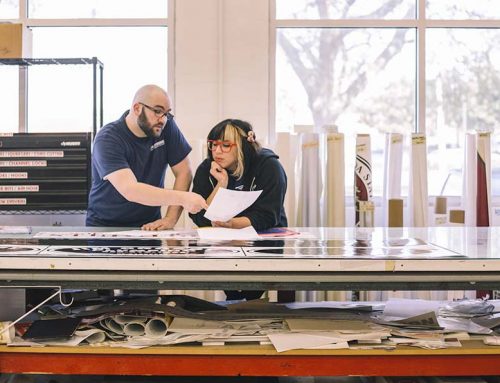Commercial real estate loans are essential to help entrepreneurs and business owners who want to stop paying rent, and own the property they operate from. They’re often used to purchase real estate, refinance real estate, or build a commercial property to start or expanding a business. There are several different varieties of commercial real estate loans, each of which may be better for a particular small business owner than another. Explore the different types of commercial real estate loans, and how best to obtain one in 2022.

Types of Commercial Real Estate Loans

Traditional Commercial Real Estate Loans Explained
Anyone looking to secure a commercial real estate loan needs to evaluate their options to find the type of loan that works best for them and their unique circumstances. Loans can vary in their requirements, maximum amounts, terms, interest rates, and more. In addition, for small businesses, there are both traditional loans and loans guaranteed by the Small Business Administration (SBA). The following are the most common types of commercial real estate loans.
Traditional Loans
Business Line of Credit: With a business line of credit, you are approved for a revolving line of credit with a maximum limit that you can borrow from the lender, similar to credit cards. You can access your line of credit for any of your business needs, and you’ll be charged interest for the amount of money you draw, not on the maximum limit.
Commercial Mortgage Loans: As the name implies, this type of loan is used to buy, refinance, or develop commercial real estate.
Franchise Loans: A franchise loan can help you purchase or expand a franchise, although you could also use a standard term loan. These loans can be used for traditional business opening expenses as well as franchise-specific expenses, such as the franchise fee. Some franchisors may offer funding to help establish the franchise.
Invoice Financing: Also called invoice factoring, this type of loan can help with your business’ cash flow if you’re waiting on invoices to be paid. With invoice financing, you sell your unpaid invoices to a lender at a discount, who then will hold a portion until the invoice is paid.
Merchant Cash Advances: With a merchant cash advance, the lender gives you a lump sum of cash in exchange for a portion of your future sales or with regular, fixed transfers. This type of loan is helpful if you need cash immediately.
Term Loans: A term loan is a fairly straightforward loan that is set for a specific amount of time (term). They tend to have fixed interest rates or fixed fees.

SBA Commercial Real Estate Loans Explained
Because SBA loans are guaranteed by the Small Business Administration, a government agency, they often have more flexible limits, interest rates, and payments than traditional bank loans. They’re great for higher-risk individuals and start-ups, but businesses of all types, including retail stores and hotels, can use them. There are several types of SBA loans, but the following are the main ones.
SBA 7(a): These are the most common types of SBA loans. SBA 7(a) loans can be used for up to $5 million with a typical repayment period of up to 25 years, depending on the loan’s use. They can be used for many different purposes, including working capital, construction, renovations, and debt refinancing, but they come with restrictions. With these loans, the SBA guarantees up to 85% of loans up to $250,000 and up to 75% of loans over that amount.
Microloans: These loans are offered up to $50,000 and available through nonprofit community lenders to new and established businesses. These loans can be used for working capital or purchasing inventory, equipment, furniture, supplies, or machinery. Microloans can’t be used to pay existing debts or purchase real estate, and the maximum repayment term is six years.
CDC/504 Loans: These loans provide businesses with long-term, fixed-rate financing for major assets such as real estate and equipment. Backed by both the SBA and a Certified Development Company (CDC), these loans can be used to purchase real estate, machinery, renovations, or to refinance debt. These loans have a maximum of $5.5 million with repayment terms of 10 to 25 years.
Disaster Loans: These are low-interest loans that can be used to repair or replace real estate, equipment, inventory, and other assets that were damaged or destroyed in a declared disaster. The SBA offers disaster loans of up to $2 million to qualified businesses.

How to Qualify for a Commercial Real Estate Loan
Whether you’re trying to obtain a traditional SBL or one guaranteed by the SBA, there are several things you must do to increase your chances of qualifying for a loan.
Build Personal and Business Credit Scores: You’re likely familiar with the personal FICO credit score, which can range from 300 to 850. If your business is a start-up, your personal credit score will be a large factor in your eligibility for a loan. Established businesses can also have a business credit score, which ranges from 0 to 100. Lenders will take your credit score and credit history into account when you apply for a commercial real estate loan.
Know the Lender’s Minimum Requirements: This may seem obvious, but each lender will have their own set of requirements before giving out a commercial real estate loan, and SBA loans have strict requirements and strings attached to qualify for one.
Present Financial and Legal Documents: There are several documents needed to obtain a loan: personal and business income tax returns, income and bank statements, personal identification, your business license, proof of a strong cash flow, and even your resume. There may be other legal documents you need to bring depending on your type of business; be sure to have everything prepared in advance.
Have a Strong Business Plan: Lenders will want to know how you plan to use the money and see that you have a strong ability to repay. Your business plan should include a complete set of projected financial statements, including a profit and loss statement, an in-depth projected financial statement, and a cash flow and balance sheet.
Offer Collateral: Collateral acts as added security and eases the lender’s concern of losing money. It can be real estate, equipment, inventory, or other assets. Not all lenders require collateral, but it can help secure the loan if there are other concerns with the application.

Secure a Commercial Real Estate Loans from PRC Commercial Real Estate Loans
The finance experts at PRC Commercial Real Estate Loans can provide advice on the best type of commercial real estate loan for your interests and then help you secure it. We are a direct nationwide lender that underwrites commercial real estate loans in-house, and we have ample experience with all types of commercial real estate loans, including SBA 504, SBA 7(a), and thousands of others. To speak with an advisor, call 877-350-9416 today.





CONNECT